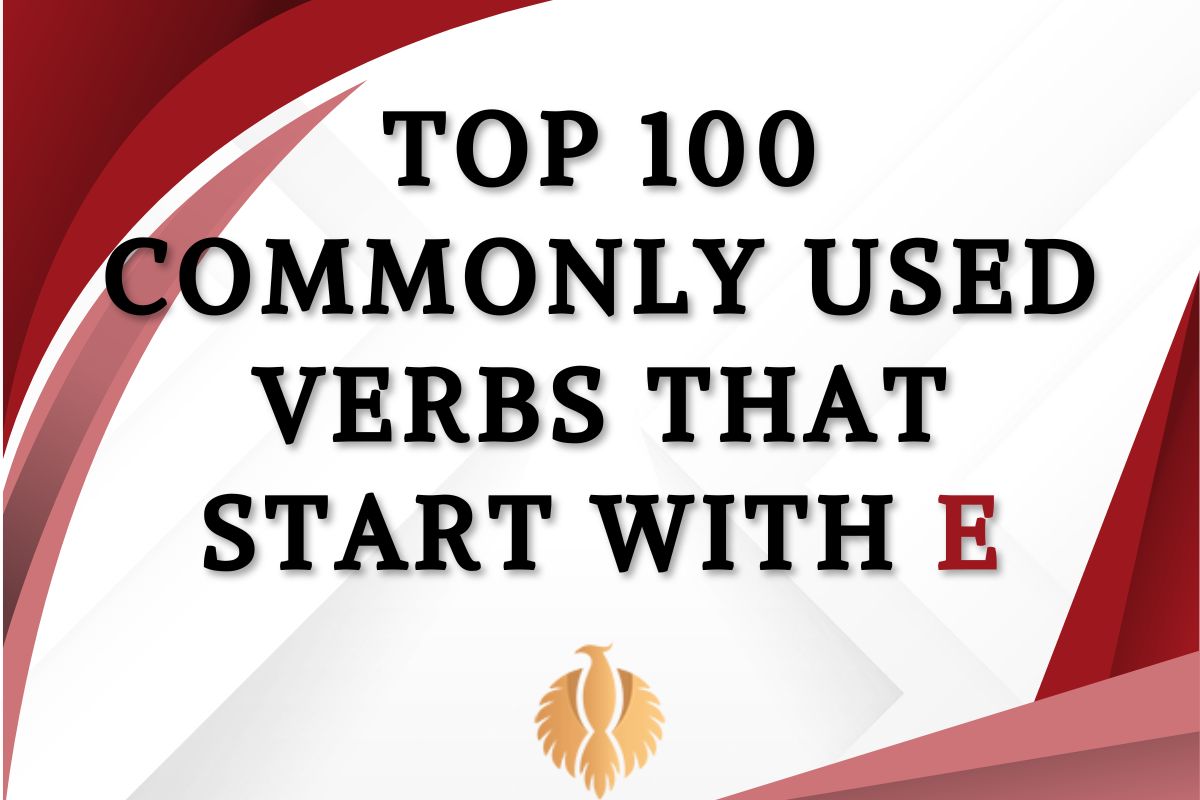In this article, we explore 100 commonly used verbs that start with the letter E. This list includes frequently used verbs like “eat,” “enjoy,” and “explain,” as well as less common but equally important verbs such as “elaborate,” “emphasize,” and “envision.” Each verb is accompanied by its definition and an example sentence to illustrate its use, allowing you to see how these verbs function in context and start incorporating them into your vocabulary.
You might also enjoy:Which of the Following: Definition + Complete Usage + Grammar
![a infographic for Top 100 Commonly Used Verbs That Start With E [2025]](https://phoenixenglishlang.com/wp-content/uploads/2024/05/unnamed-16.png)
Learning new verbs is not just about expanding your vocabulary; it’s also about improving your ability to express yourself clearly and effectively. By understanding the nuances of different verbs, you can choose the right word for the right situation, making your communication more precise and impactful. For example, knowing the difference between “elicit” and “evoke” can help you convey your message more accurately.
Familiarizing yourself with these verbs can also aid in understanding and interpreting texts better. Knowing the meaning of unfamiliar verbs can provide better insight into the text’s overall message, which is particularly useful in academic settings, professional environments, and everyday conversations.
By mastering verbs like these, whether you are writing an essay, having a conversation, or reading a book, these verbs will serve as powerful tools in your linguistic arsenal. Enjoy the journey of expanding your vocabulary and enhancing your communication skills with these commonly used verbs starting with the letter E.
You Might Also Enjoy:Reinforce Vs Reenforce: 10 Differences + Examples [2025]
Here are 100 commonly used verbs that start with E:
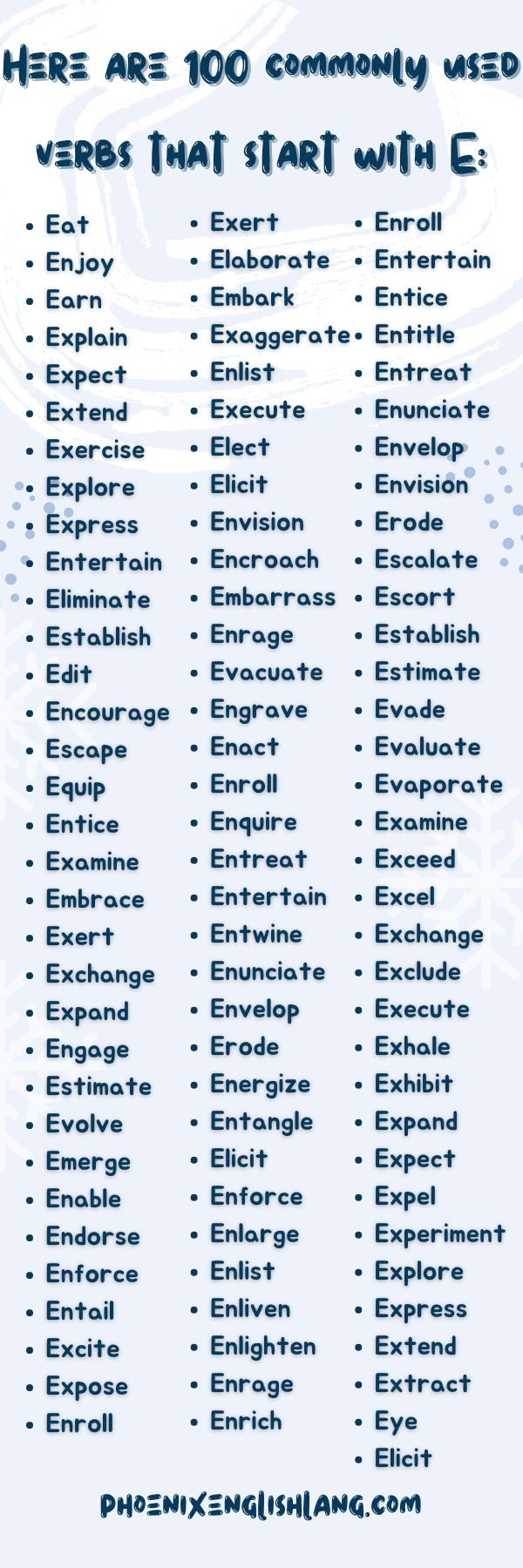
- Eat
- Enjoy
- Earn
- Explain
- Expect
- Extend
- Exercise
- Explore
- Express
- Entertain
- Eliminate
- Establish
- Edit
- Encourage
- Escape
- Equip
- Entice
- Examine
- Embrace
- Exert
- Exchange
- Expand
- Engage
- Estimate
- Evolve
- Emerge
- Enable
- Endorse
- Enforce
- Entail
- Excite
- Expose
- Enroll
- Exert
- Elaborate
- Embark
- Exaggerate
- Enlist
- Execute
- Elect
- Elicit
- Envision
- Encroach
- Embarrass
- Enrage
- Evacuate
- Engrave
- Enact
- Enroll
- Enquire
- Entreat
- Entertain
- Entwine
- Enunciate
- Envelop
- Erode
- Energize
- Entangle
- Elicit
- Enforce
- Enlarge
- Enlist
- Enliven
- Enlighten
- Enrage
- Enrich
- Enroll
- Entertain
- Entice
- Entitle
- Entreat
- Enunciate
- Envelop
- Envision
- Erode
- Escalate
- Escort
- Establish
- Estimate
- Evade
- Evaluate
- Evaporate
- Examine
- Exceed
- Excel
- Exchange
- Exclude
- Execute
- Exhale
- Exhibit
- Expand
- Expect
- Expel
- Experiment
- Explore
- Express
- Extend
- Extract
- Eye
- Elicit
These verbs encompass a wide range of actions and are fundamental to effective communication and expression in the English language.
They are used in various contexts, from everyday conversations to formal writing, and play a crucial role in conveying meaning and intention.
From simple actions like “eat” and “exercise” to more complex concepts such as “evaluate” and “envisio.
What is the action word for the letter E?
The action word for the letter ‘E’ is “Engage.”
The action word for the letter E is “execute.”
The action word for the letter E is “enunciate.”
What is a helping verb that starts with E?
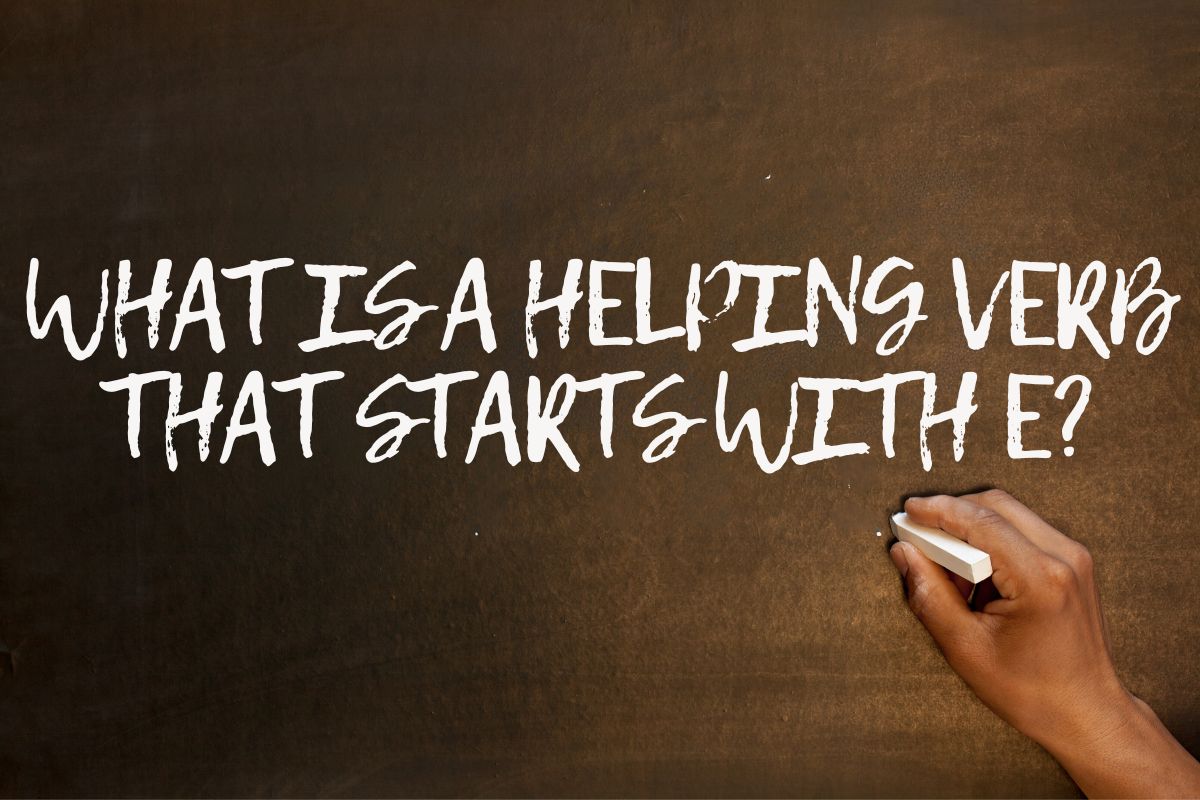
A helping verb that starts with ‘E’ is “has.”
What is a positive noun that starts with E?
A positive noun that starts with the letter E is “excellence.”
A positive noun that starts with ‘E’ is “Empathy.”
What type of word is an E?
The letter “E” can function as a vowel, consonant, or even be part of compound words. It serves different roles in the English language, depending on its position in a word and the context in which it is used.
What is example of E verb noun?
An example of a noun and a verb both starting with ‘E’ could be:
Noun: Elephant
Verb: Explore
For example: “She decided to explore the jungle and encountered an elephant along the way.”
How do you identify E verb?
To identify a verb that starts with ‘E,’ look for words that represent actions or states. Verbs are typically action words, and those starting with ‘E’ might include:
– Eat
– Explore
– Explain
– Enhance
– Empower
These words indicate actions or processes, making them verbs.
Is E verb a doing word?
Yes, indeed. A verb, including those starting with ‘E,’ is a doing word. Verbs represent actions, processes, or states, indicating what the subject of a sentence is doing or the condition it is in.
You might also enjoy:Where Does “How is your Day Going?” Originate From?
How do you identify E verb in a sentence?
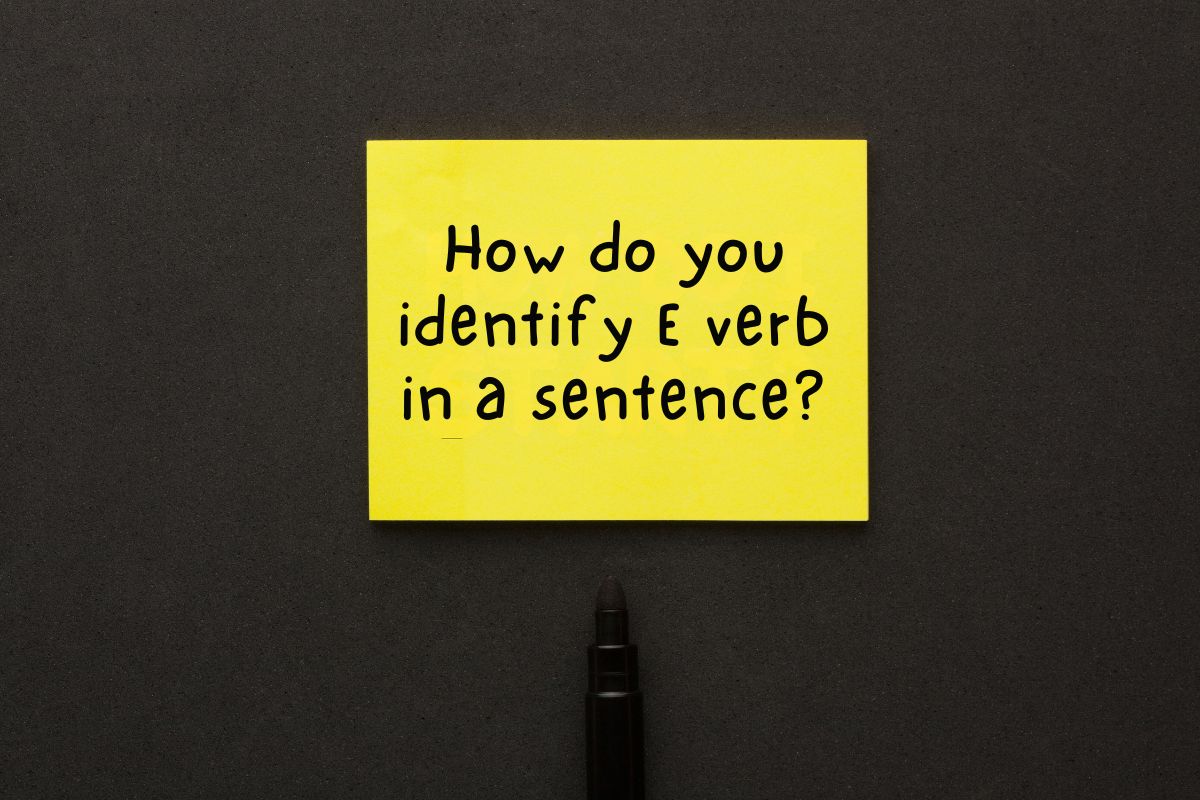
To identify a verb that starts with ‘E’ in a sentence, look for words that represent actions, processes, or states. Pay attention to what is happening or being described. Here’s an example:
Sentence: “She eagerly explored the enchanting forest.”
In this sentence, “explored” is the verb that starts with ‘E’ because it indicates the action the subject (she) is performing – exploring.
Essay about verbs that start with E
Exploring the realm of verbs beginning with the letter ‘E’ opens a gateway to a spectrum of actions and expressions.
One prominent ‘E’ verb is “empower.” To empower is to grant authority or strength, fostering a sense of confidence and capability. It embodies the idea of uplifting individuals or communities.
“Educate” is another impactful ‘E’ verb. Education serves as a catalyst for personal and societal growth.
Through imparting knowledge, we equip ourselves and others with the tools to navigate an ever-evolving world.
As we engage in various activities, we “exercise” our bodies and minds. Exercise is not merely physical; it extends to mental challenges that invigorate and enhance cognitive functions. The act of exercising embodies a commitment to well-being.
In our interactions, we “exchange” ideas and experiences. This verb transcends the mere sharing of information; it symbolizes the dynamic flow of thoughts and perspectives, contributing to the rich tapestry of human communication.
Exploration, a quintessential ‘E’ verb, fuels curiosity and discovery. Whether venturing into the unknown or probing the depths of knowledge, the spirit of exploration propels us forward, unraveling mysteries and expanding our understanding.
The verb “embrace” encapsulates the concept of acceptance and inclusion. To embrace is to welcome diversity, ideas, and challenges, fostering an environment of understanding and unity.
In our daily lives, we often “enjoy” moments of pleasure and contentment. Enjoyment signifies an appreciation for life’s simple pleasures, reminding us to savor the present and find joy in various aspects of our existence.
Expressing oneself is fundamental to human communication, and the verb “express” encapsulates this phenomenon. Whether through words, art, or actions, expression is a conduit for emotions, thoughts, and individuality.
Examining verbs that commence with ‘E’ reveals a tapestry of actions that shape our lives. From empowering and educating to exercising and embracing, each verb contributes uniquely to the intricate dance of human experience.
In this linguistic landscape, ‘E’ verbs emerge as dynamic catalysts for personal and collective growth, encapsulating the essence of action, expression, and interconnectedness.
You Might Also Enjoy: Top 60 Most Common Simple Sentences In English
Here’s are 100 commonly used verbs that start with the letter E with their definitions:
- Earn: To receive money or a salary through work or accomplishment.
- Eat: To consume food by chewing and swallowing.
- Edit: To modify or correct a piece of writing, film, or other media.
- Educate: To provide knowledge or instruction to someone.
- Employ: To hire or engage someone to perform work.
- Encourage: To give support, confidence, or hope to someone.
- Enjoy: To experience pleasure or satisfaction from something.
- Establish: To set up or create something, such as a company or organization.
- Examine: To inspect or scrutinize something carefully.
- Exercise: To engage in physical activity for health or fitness purposes.
- Expand: To make larger or more extensive.
- Expect: To anticipate or look forward to something happening.
- Explain: To make something understandable or clear by describing or providing information about it.
- Explore: To travel through or investigate an unfamiliar area or subject.
- Export: To send goods or services to another country for sale or trade.
- Express: To convey or communicate thoughts, feelings, or ideas.
- Extract: To remove or obtain something by applying force or effort.
- Eye: To look at closely or observe attentively.
- Examine: To inspect or investigate thoroughly.
- Exhibit: To display or present something publicly.
- Extend: To make longer or last for a longer period of time.
- Enhance: To improve or augment the quality or value of something.
- Exchange: To give or receive one thing in return for another.
- Elect: To choose or select someone for a particular position or office.
- Enforce: To compel or ensure compliance with a rule, law, or order.
- Expect: To believe or anticipate that something will happen.
- Emphasize: To give special importance or attention to something.
- Entertain: To provide amusement or enjoyment to someone.
- Excite: To cause strong feelings of enthusiasm, joy, or anticipation.
- Enroll: To sign up or register for a particular course, program, or membership.
- Endorse: To publicly declare support or approval for something or someone.
- Equip: To provide someone or something with the necessary items or skills for a particular purpose.
- Expand: To become or make larger in scope, size, or significance.
- Establish: To set up or create something, typically a system, organization, or institution.
- Exclaim: To cry out suddenly and loudly, typically in surprise, anger, or excitement.
- Enclose: To surround or cover completely, usually by placing something inside or around it.
- Exchange: To give, receive, or trade one thing for another.
- Enlighten: To inform or instruct someone in order to improve their knowledge or understanding.
- Exert: To use physical or mental effort to accomplish something.
- Entice: To attract or tempt someone by offering something desirable.
- Estimate: To make an approximate calculation or judgement.
- Evaluate: To assess or judge the value, importance, or quality of something.
- Emit: To release or give off (something), usually in the form of light, heat, sound, or gas.
- Explore: To travel through or investigate an unfamiliar area or subject.
- Enrich: To improve or enhance the quality or value of something.
- Enlist: To recruit or engage someone to participate in a cause, organization, or activity.
- Examine: To inspect or scrutinize something carefully.
- Enjoy: To experience pleasure or satisfaction from something.
- Expose: To make visible or known, especially something that was previously hidden or secret.
- Extract: To remove or obtain something by applying force or effort.
- Establish: To set up or create something, such as a company or organization.
- Exploit: To take advantage of or benefit from something unfairly.
- Eliminate: To completely remove or get rid of something.
- Encourage: To give support, confidence, or hope to someone.
- Exhibit: To display or present something publicly.
- Expand: To make larger or more extensive.
- Exchange: To give or receive one thing in return for another.
- Examine: To inspect or investigate thoroughly.
- Exist: To have objective reality or being.
- Evaluate: To assess or judge the effectiveness, value, or significance of something.
- Expect: To anticipate or look forward to something
You might also enjoy:Interested In or On: The Differences + Examples [2025]
Exploring the Enigmatic: A Compilation of Vibrant Verbs Beginning with E
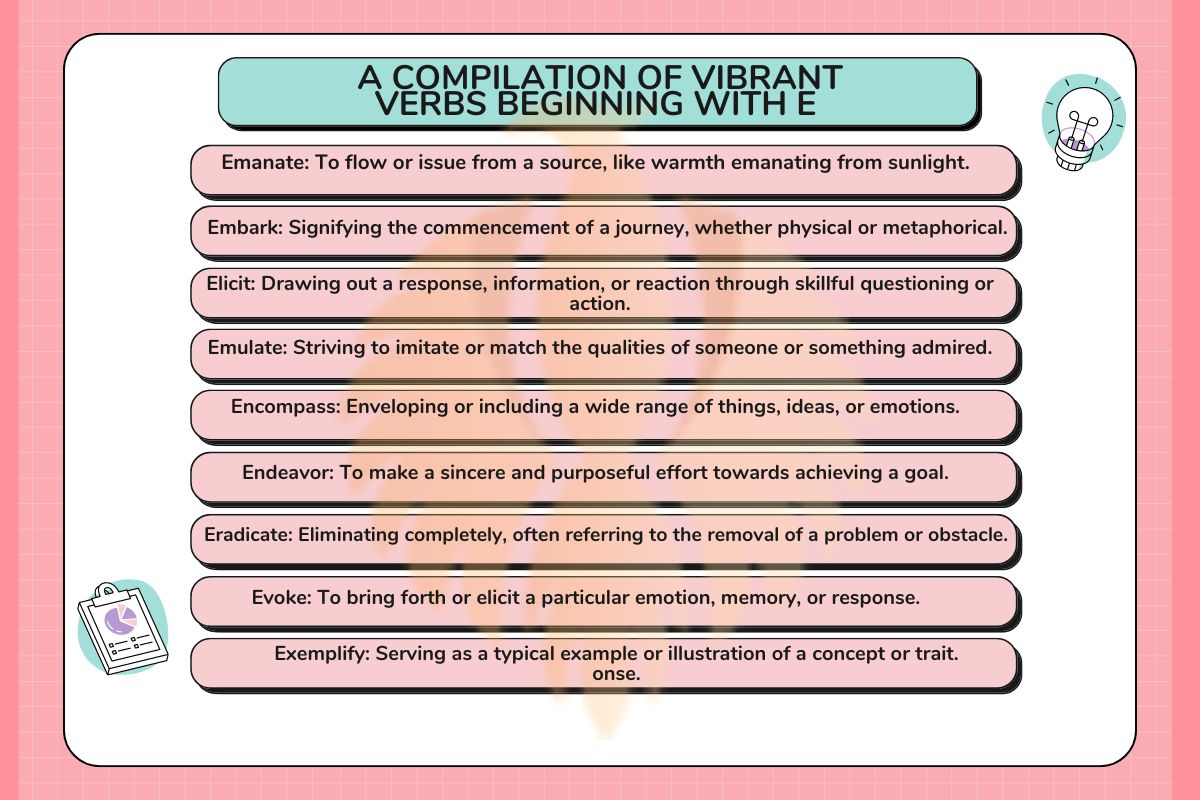
Verbs, the dynamic engines of language, play a crucial role in conveying action and expression.
This article delves into the captivating realm of verbs that commence with the letter E, uncovering their diverse uses and nuances.
- Emanate: To flow or issue from a source, like warmth emanating from sunlight.
- Embark: Signifying the commencement of a journey, whether physical or metaphorical.
- Elicit: Drawing out a response, information, or reaction through skillful questioning or action.
- Emulate: Striving to imitate or match the qualities of someone or something admired.
- Encompass: Enveloping or including a wide range of things, ideas, or emotions.
- Endeavor: To make a sincere and purposeful effort towards achieving a goal.
- Eradicate: Eliminating completely, often referring to the removal of a problem or obstacle.
- Evoke: To bring forth or elicit a particular emotion, memory, or response.
- Exemplify: Serving as a typical example or illustration of a concept or trait.
- Expedite: Speeding up a process or action to ensure prompt completion.
- Extricate: Freeing or disentangling from a difficult or complex situation.
- Emanate: Emitting or radiating, often used to describe the release of energy or substances.
As these verbs empower language with precision and depth, incorporating them into your writing can enhance clarity and evoke vivid imagery. Whether you’re an avid writer or simply a language enthusiast, experimenting with this eclectic array of verbs promises to enrich your communication.
You might also enjoy:What Kind of Vs What Kinds of – Differences + Examples [2025]
What attitude starts with letter E?
An attitude that starts with the letter ‘E’ is “Enthusiastic.” An enthusiastic attitude reflects eagerness, passion, and positive energy towards a particular task, goal, or situation.
Adverbs that start with E
Here are some adverbs that start with the letter E:

- Eagerly: In an enthusiastic or eager manner.
- Easily: Without difficulty or effort.
- Efficiently: In a competent and effective way.
- Elsewhere: In or to another place.
- Emotionally: In relation to emotions or feelings.
- Endlessly: Without limit or ceaselessly.
- Entirely: Completely or wholly.
- Especially: Particularly or exceptionally.
- Eventually: In the end or ultimately.
- Evermore: Always or forever.
Adverbs that start with e for kids
Sure! Here are some adverbs that start with “e” that are suitable for kids:
- Easily: In a simple or effortless manner.
- Early: Before the expected time or ahead of schedule.
- Eagerly: With enthusiasm or excitement.
- Evenly: In a balanced or equal way.
- Ever: At any time.
- Everywhere: In all places or locations.
- Exactly: Precisely or accurately.
- Excitedly: With great excitement or anticipation.
- Extremely: Very greatly or to a high degree.
What are some vivid words that start with E?
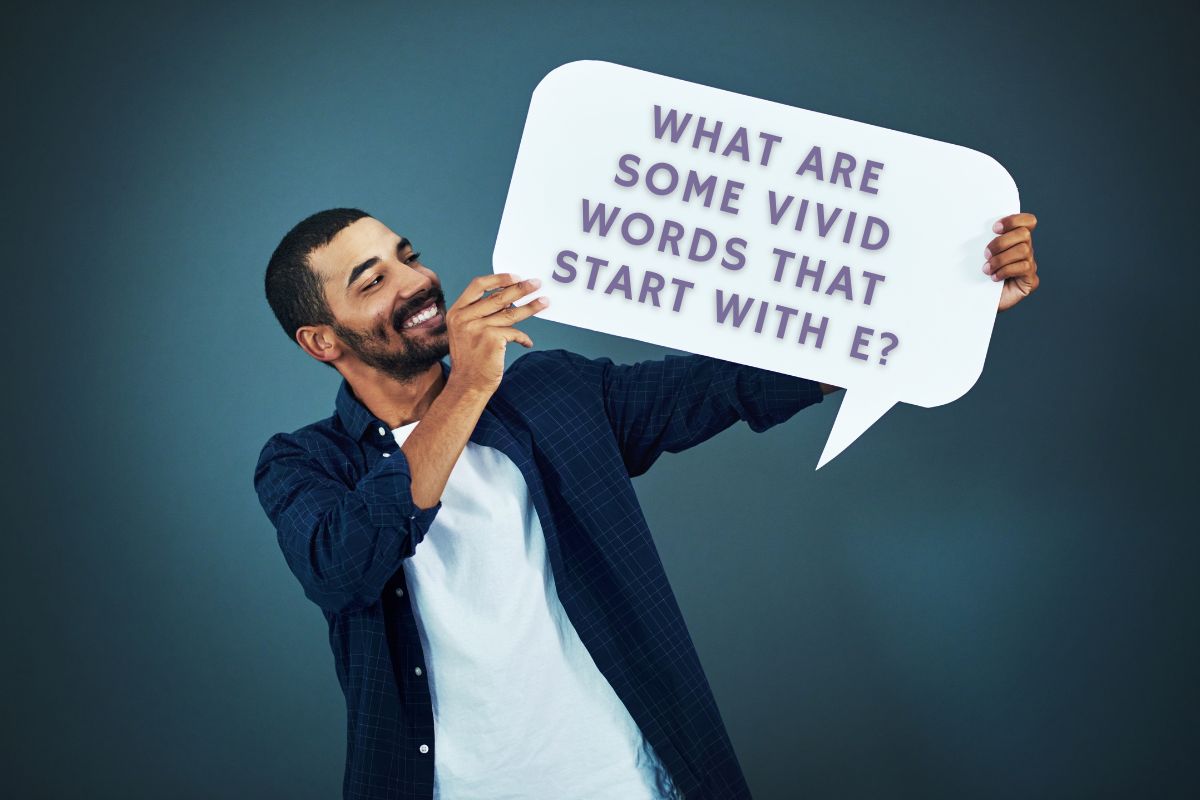
Here are some vivid words that start with ‘E’:
- Ephemeral
- Ebullient
- Effervescent
- Elusive
- Enchanting
- Exuberant
- Exquisite
- Eclipsing
- Efflorescent
- Electrifying
These words can add vibrancy and richness to descriptions or expressions.
You might also enjoy:Too Cute Meaning Vs To Cute (To Vs Too) + Examples
Verbs that start with e to describe a person
Here are some verbs that start with ‘E’ to describe a person:
- Empower
- Encourage
- Energize
- Elevate
- Enlighten
- Enchant
- Embrace
- Excel
- Express
- Exemplify
These verbs highlight positive qualities and actions that can characterize a person.
common verbs that start with e
Here are some common verbs that start with ‘E’:
- Eat
- Enjoy
- Explain
- Explore
- Encourage
- Educate
- Entertain
- Examine
- Expand
- Expect
These verbs cover a range of everyday actions and activities.
Can you provide a summary of the top 10 commonly used verbs that start with E ?
Here’s a summary of the top 10 commonly used verbs that start with ‘E’:
- Eat:Consume food for sustenance.
- Enjoy: Take pleasure or satisfaction in an activity or experience.
- Explain: Make something clear or understandable.
- Explore:Travel through unfamiliar places or investigate new ideas.
- Encourage: Inspire or give support to someone’s efforts.
- Educate:Provide knowledge or information to impart learning.
- Entertain:Amuse or provide enjoyment through performance or activities.
- Examine:Inspect or scrutinize closely.
- Expand: Increase in size, scope, or quantity.
- Expect: Anticipate or look forward to the occurrence of something.
These verbs cover a variety of actions and are frequently used in everyday language.
What is a positive noun that starts with E
One positive noun that starts with E is “enthusiasm.”
A positive noun that starts with ‘E’ is “Endeavor.” Endeavor refers to a determined and purposeful effort or attempt to achieve a goal, reflecting a positive and proactive approach.
You might also enjoy:How Are You Fairing or Faring? Differences + Examples
verbs that start with e with meaning?
Here are some other verbs that start with “E” along with their meanings:
- Elicit: To draw out or evoke a reaction or response.
- Eradicate: To completely destroy or eliminate.
- Examine: To inspect or scrutinize closely.
- Embark:To begin or start a journey or undertaking.
- Enlighten: To provide knowledge or insight; to make aware.
- Endorse: To express approval or support for something.
- Evoke:To bring forth or summon a feeling, memory, or response.
- Exaggerate:To overstate or magnify something beyond the truth.
- Execute: To carry out or accomplish a task or action.
- Educate: To impart knowledge or skills through teaching.
Conclusion
As we conclude our exploration of the top 100 commonly used verbs that start with the letter E, it’s clear that these verbs play a vital role in our daily communication.
From simple actions like “eat” and “enjoy” to more complex processes such as “evaluate” and “envision,” these verbs help us express a wide range of activities, thoughts, and emotions.
Verbs are the engines of language, driving the action and providing clarity to our sentences. By understanding and utilizing these verbs, we can enhance our ability to communicate effectively and precisely.
Whether you are writing an essay, engaging in a conversation, or simply trying to articulate your thoughts, having a robust vocabulary of verbs at your disposal is invaluable.
Throughout this article, we have delved into the meanings and uses of various verbs that start with E. Each verb has its unique significance and application, contributing to the richness and diversity of the English language.
For instance, verbs like “empower” and “encourage” are essential for motivating and inspiring others, while verbs such as “examine” and “evaluate” are crucial for critical thinking and analysis.
Moreover, these verbs are not just limited to everyday conversations; they are also integral to academic writing, professional communication, and creative expression. In academic settings, verbs like “elaborate” and “explain” help in presenting detailed arguments and clarifications.
In professional environments, verbs such as “execute” and “enforce” are key to implementing plans and policies. In creative writing, verbs like “envision” and “evoke” bring stories and characters to life.
Learning and mastering these verbs can also aid in language acquisition and literacy development.
For students and language learners, understanding the nuances of different verbs can improve reading comprehension and writing skills. It allows them to grasp the context and meaning of texts more accurately and express their ideas more effectively.
Furthermore, expanding your verb vocabulary can enhance your cognitive abilities. It encourages you to think more critically and creatively, as you have a broader range of words to choose from when describing actions and events.
This linguistic flexibility can lead to more engaging and persuasive communication.
In addition to their practical applications, verbs that start with E also offer a fascinating glimpse into the etymology and evolution of the English language. Many of these verbs have roots in Latin, Greek, and other languages, reflecting the rich history and cultural influences that have shaped English over the centuries.
In summary, the top 100 commonly used verbs that start with E are more than just words; they are powerful tools for communication, learning, and expression. By incorporating these verbs into your vocabulary, you can enhance your language skills and communicate with greater clarity and impact.
Whether you are a student, a professional, or simply a lover of language, these verbs will serve as valuable assets in your linguistic toolkit.
Thank you for joining us on this journey through the vibrant world of verbs that start with E.
We hope this article has provided you with valuable insights and inspiration to explore and utilize these verbs in your own communication. Keep practicing, keep learning, and keep expressing yourself with confidence and creativity

Hi, welcome to my blog! My name is Omid and I am thrilled to have you here! I am an English language teacher with 12 years of experience and hold multiple international certifications (TESOL, IELTS, TOEFL, PTE, CELTA). Additionally, I hold a PhD in Applied Linguistics with a specialization in Teaching English as a Second Language (TESL), which fuels my passion for teaching English and assisting others in mastering the language. To me, nothing is more rewarding than helping individuals enhance their English language abilities through various methods. So, let’s embark on this journey of learning English together.

